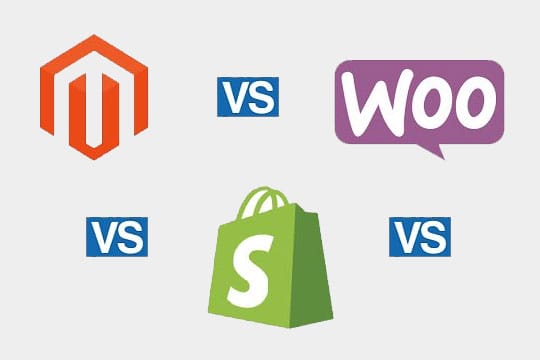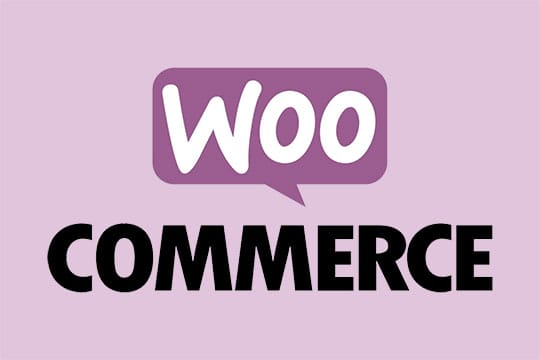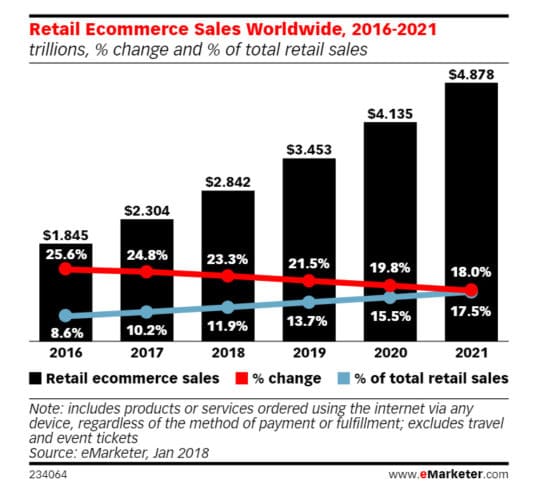Article Note: This article “Magento vs Shopify vs WooCommerce: The E-Commerce Battle” was first published on 12th October 2018. We have last updated this article on 2nd April 2021 with fresh information.
When you’re building an eCommerce site, one of the most important aspects to consider is which platform to use as a content management system (CMS). This is the tool that will sit beneath the dashboard of your site. It allows you to add and manage new products.
When it comes to choosing that platform, there are three providers in the space that you’ll want to look at. Magento, Shopify, and WooCommerce. They each have different advantages and disadvantages, and they’re each suitable for different types of build.
Because these systems underpin the entirety of your site and allow you to manage products, categories, orders, and inventory, they can quickly become the most powerful tool you have access to. And what’s why getting it right at the start and building your eCommerce store with the right CMS is so important.
Here’s what you need to know.
Why Magento, Shopify, or WooCommerce?

Because of several reasons, these days, there is a great demand for E-commerce websites. Generally, tech-savvy people prefer buying products online rather than visiting brick-and-mortar shops. So, business brands go online with an E-commerce website to reach out to a large number of audience easily within a few days and ensure the sale of their products in bulk on a daily basis.
To be frank, most companies have a limited budget for the development of E-commerce portals. Only a few of them have abundant budgets to get started from scratch as the creation and successful management of E-commerce websites need a considerable investment of cash. Therefore, companies use E-commerce platforms to have an online presence of their business empire.
Image source: eMarketer.com.
Due to the availability of various options, most entrepreneurs often get confused and remain in an indecisive mode as to which E-commerce platform is best suited for meeting their specific needs fully. Magento, Shopify, and WooCommerce are 3 big names in this regard.
| E-commerce Portals | Current Market Share |
|---|---|
| Magento | 3.44% |
| Shopify | 10.98% |
| WooCommerce | 28.24% |
Recommended for you: The Big Six of an eCommerce Team – Who You Need to Hire and Why?
What is Magento?

Magento is built in PHP and has been on the market for nearly fifteen years, which makes it a tried and tested platform with a solid reputation. It’s one of the most popular CMSs in the world, powering 3.44% of all eCommerce sites.
It’s now owned by Adobe, but that doesn’t mean it’s going to set you back as much as it costs for a Creative Cloud license. That’s because Magento is open source, meaning that the source code is available for free for anyone to use and to modify.
This also means that Magento is one of the most versatile eCommerce platforms on the market because it can easily be adapted to suit different builds, with new plugins and templates freely or cheaply available.
Pros and Cons of Magento
Many of Magento’s advantages come from the fact that it’s open-source, and so while there is such a thing as a default Magento setup, it can quickly and easily be customized to look and feel however you want it to. Developer time will always be expensive, but you can save a lot by using templates and themes that people have already developed and made available for free.
One of the major benefits of using Magento is the fact that it’s already so widely available, that most developers are used to working with it. So are most eCommerce executives. Put together, this means that there’s usually no need for an extensive (and expensive) learning curve. You can just install it and get started.
Unfortunately, its popularity also leads to its biggest drawback. Because there are so many people looking for weaknesses, it can be less secure and more vulnerable to attack. This is especially true if you’re running a large number of add-ons, each of which can potentially open up a new security risk.
Who Needs Magento?
Magento is interesting because it makes for a pretty good default for brands of all shapes and sizes, and it also provides growing room for if you plan to start small and to scale up as your site gains in popularity,
Magento is also a good call if you have brick-and-mortar stores, as well as an eCommerce website. That’s because you can use Magento POS to power point-of-sale devices at your store and you can cross-reference inventory between your online and offline shops.
This, combined with the professional look and feel that it brings to the table, makes it the go-to eCommerce provider in the majority of situations. In fact, it makes more sense to flip the question around and to ask who doesn’t need it. You should assume you’re going to want to use Magento unless you can find something better.
What is Shopify?

You can think of Shopify as more of an entry-level eCommerce platform, with much less customization than you can get with other choices. Part of that is because, as opposed to being a piece of open-source software that people take and customize to suit them, it’s a piece of proprietary software that’s owned by a parent company.
Shopify is mostly different from the other providers on their list because they go out of their way to cater to eCommerce newbies, providing a simple tool that’s easy to set up and start using. It might not be as heavy-duty as its competitors when it comes to functionality, but it’s so easy to use that literally anyone can get it up and running with no prior experience required.
Pros and Cons of Shopify
Shopify isn’t open-source, which means that you won’t be able to tap into the huge pool of third-party add-ons and designs that are available on other eCommerce content management systems. With that said, it also means that they have a good reason to provide customer service and to develop new features that people often ask for.
You can expect to pay a regular fee for Shopify, although that typically includes hosting on their servers. You’re committing yourself to stick with their system, which means that you could find yourself running into problems if they ever go bust, but it is also generally much easier to get to grips with than some of the other platforms on the market.
Who Needs Shopify?
As you’ve probably guessed from what we’ve said so far, Shopify is best-suited to people who are new to eCommerce and who want something that they can use to get a site off the ground without too much trouble. It’ll walk you through the process and allow you to create a simple eCommerce store with zero prior expertise.
That makes it nicely suited for small businesses and even for sole traders who are selling products out of their spare room. That doesn’t mean that you can’t create a professional quality eCommerce store, though. It just might not have the same level of customization that you’d expect from other providers.
What is WooCommerce?

WooCommerce is like Magento in that it’s open-source, and so it has many of the same advantages and disadvantages. As an open-source platform, it comes with most of the default features that you’d expect from an eCommerce provider, from inventory management to customer relationship management.
It’s designed from the ground up to be easy to use while simultaneously offering a decent amount of functionality, making it a pretty solid all-rounder and one of the main competitors in the marketplace.
It’s also the most popular eCommerce provider amongst the million most highly visited eCommerce stores on the planet. And there’s a reason why it’s so popular, as you’re about to discover.
Pros and Cons of WooCommerce
WooCommerce is free and open-source, and so it has a lot of the same advantages as Magento. This includes the fact that it’s free with cheap or free addons and templates, as well as the fact that there’s a decent support community and that most developers already have a decent working knowledge of it.
One of the nicer benefits of using WooCommerce is that you won’t be charged transaction fees, which are common on platforms like Shopify. This might not matter too much if you’re only selling a couple of items a week as a second income, but it can add a crippling extra overhead if you’re a professional retailer.
Who Needs WooCommerce?
WooCommerce is best thought of as an alternative to Magento if you’re looking for high customization and the ability to build a powerful and scalable eCommerce site that can grow with you as you build the business and add new products and categories.
It’s pretty easy to pick up and to wrap your head around, and it perhaps has a slight edge on Magento when it comes to sheer performance. Are you planning on running a streamlined build with a focus on security and page loading times? WooCommerce might be your best option. Are you looking for overall functionality and flexibility? Then, Magento has the edge.
If you’re trying to build a seriously competitive eCommerce site, the real choice is whether to go with WooCommerce or Magento. That’s a much more difficult question to answer, but if pushed then we’d probably still go with Magento. But you might be different!
You may like: How AI & Machine Learning are Affecting the Future of eCommerce?
Magento vs Shopify vs WooCommerce: The Battle

So, we will analyze these 3 platforms on different parameters and try to find which one is best for you. Let’s get started.
| Magento | Magento is one of the most popular E-commerce platforms, well-suited for medium and large-scale business organizations. It is a technically advanced open source E-commerce platform with lots of features; such as lots of extensions, content management functions, powerful marketing tools, etc. |
|---|---|
| Shopify | Shopify is a universal e-commerce platform, which allows you to create professional & eye-catching E-commerce websites, get payments from customers, and manage a warehouse without worrying about the technical aspects of site management. |
| WooCommerce | WooCommerce is an – eCommerce plugin, from WordPress. This easy-to-use E-commerce platform is fit for creating small online shopping websites. Available totally free of cost to all. |
1. The Initial Cost of Starting A Functional Store

| E-commerce Platform | Initial Cost for the commencement of E-store (Estimated value) |
|---|---|
| Magento | From $50,000, $100,000-$250,000 |
| Shopify | You can open a Shopify shop with a monthly subscription fee of $29. You need to pay around a processing fee of 2.9% on each transaction made on your platform. |
| WooCommerce | $800 which includes the cost of good quality themes, plugins, payment gateways, hosting, etc. |
2. The Availability of Extensions & Themes

| E-commerce Platforms | The Availability of Extensions & Themes |
|---|---|
| Magento | Free and Premium |
| Shopify | Free and Premium |
| WooCommerce | Free and Premium |
3. Technical Complications

In order to run a fully-fledged E-commerce website, you are supposed to have a solid command of different technical issues. Good understanding of website functionalities, different types of online security attacks and tricks to deal with it, SEO, payment gateways, etc. are vital.
| E-commerce Platforms | Technical Complications |
|---|---|
| Magento | To run and manage a Magento website successfully, you need to be technically advanced. Always keep in mind that Magento is not for Non-technical folks. If you an entrepreneur with limited knowledge of different technical terms, better hire a team of professionals, provided by IT companies to operate your website successfully. |
| Shopify | Its developers take care of the technical issues of your website. So, just pay them a monthly subscription fee and the commission amount on each transaction and keep using your website without facing any technical glitch. Good for both technical and non-technical people. |
| WooCommerce | To run a WooCommerce website, you don’t need to gain a deep knowledge of different technical issues as the availability of different plugins and themes helps you a lot. However, if you have a basic knowledge of different coding languages, SEO, and business marketing, you can easily run your website yourself. |
4. Scalability

When your business grows and the expectations of customers keep soaring with each passing day, you need to expand your site’s capabilities sooner or later to meet the growing demands of customers. All these 3 platforms come with excellent scalability features, allowing you to increase your site’s capability without spending lots of money. You will be surprised to know that WooCommerce supports the multisite feature. It means that you can run multiple E-commerce websites from one backend and make huge revenues every day with a low investment.
You may also like: How to Successfully Create an Influencer Marketing Campaign for ECommerce?
Magento vs Shopify vs WooCommerce: The Final Verdict

Deciding which eCommerce software to use is an important decision and one which will shape the future of your business. This isn’t a decision that you should make in a hurry. It also isn’t one where we can provide you with a one-size-fits-all answer.
The debate and controversy over Magento, Shopify, and WooCommerce have been going on for a long period of time. All these 3 E-commerce platforms have their strengths and weaknesses. As every business owner wants to gain the maximum benefits ASAP on low investment, the careful selection of the E-commerce platform matters a lot. Honestly, Magento is for Medium and small-sized business organizations. Shopify and WooCommerce are ideal for all those business persons who intend to start their E-commerce journey with a small or medium-scale online shopping site in quick succession.
With that said, we’ve already established that Magento makes for a pretty good default. And we’ve also covered why you might want to look into alternatives. With all of that information under your belt, you should be ready to go ahead and make a final decision on which eCommerce platform is best for you. Of course, if you’re ever in doubt then you can always speak to a web developer and ask them for their opinion. Just be warned that if they have particular experience of working with a specific CMS, they might recommend that one regardless of whether it’s best for you. Do your own research before agreeing to anything. Good luck!
We have written this article in association with Andrew Mikhailov and Stephen Chong. From 2017 as a CTO at Zfort Group, Andrew Mikhailov concentrates on growing the company in the areas of modern technologies like Artificial Intelligence, BigData, and IoT. Being a CTO, Andrew doesn't give up programming himself because it is critical for some of the projects Andrew curates as a CTO. Stephen Chong works as a writer for Fonbell Solution, an IT firm offering web-based services and software solutions such as Web Design, Invoice Billing Software, Online Appointment Systems in Singapore. He would love to share the experience, knowledge, and thoughts with others on the web.







